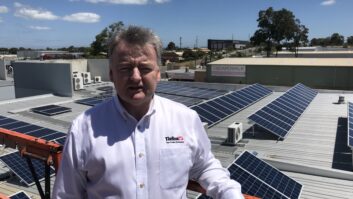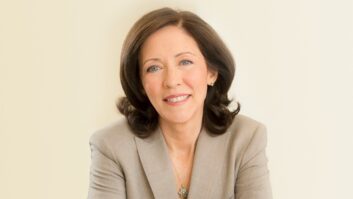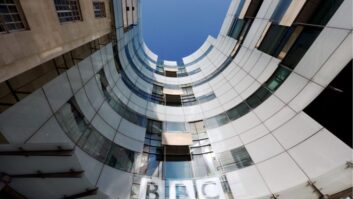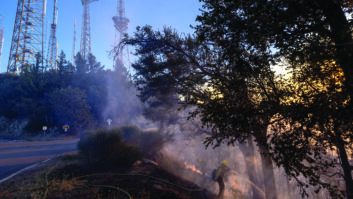A Radio World ebook explores sustainability trends in radio broadcasting. This is an excerpt.
Barbara H. Lange is principal and CEO of Kibo121, a boutique agency that focuses on guiding media tech companies in taking practical steps on their path to sustainability. She is co-founder and producer of the Media Tech Sustainability Series and program director of the NAB Show Excellence in Sustainability Awards.
Radio World: How would you define sustainability as it relates to our industry?

Barbara Lange: Sustainability is a term that often gets equated with ESG — Environmental, Social and Governance.
In fact, sustainability, in its truest form, is the intersection of economic, social and environmental concerns within a business. We usually think only of the environmental concerns, but you need the people (social) and the business (economic) to work in tandem to enable more environmentally focused solutions in the business.
Further, ESG is the term of art that is used in the investor community, where public organizations are shaping their ESG efforts and messaging to attract investors.
RW: What is your own company’s role?
Lange: Kibo121 is a consultancy focused on helping the media tech sector to operate more sustainably and to collectively help the industry reduce its carbon footprint. We work with organizations of all types and sizes to help them address their specific needs. Kibo121 brings expert advice, from conducting carbon emissions assessments to training to strategic thinking.
RW: How important are sustainability considerations to broadcast organizations, in your experience?
Lange: Broadcasters are largely defined by their investor community and regulatory mandates, depending on where they sit in the world. These drivers will in turn determine their approach to sustainability. For example, a European broadcaster is now regulated to provide extensive carbon emissions data, which results in pushing the sustainability efforts deep and wide across the organization. Things like supply chain management become an integral tool in helping that broadcaster to achieve its stated targets.
On the other hand, a U.S.-based broadcaster is driven towards adopting sustainability practices because its investors are asking for it. That presents a much different approach and sets of targets. In both cases, adopting sustainability practices helps to advance a reduced carbon footprint.
RW: What kind of practices would fall under this discussion?
Lange: Sustainability in the media market covers five major categories. These include energy consumption, waste management, water management, supply chain management and employee engagement.
Under each of these categories, a media tech business can take very specific actions. Reducing energy and changing energy sources from fossil fuels to renewables, for example, can have big benefits. Think EVs and new battery technology. Recycling or repurposing materials and equipment to extend its life. Think sets, camera equipment, laptops and even phones. Water management comes into play in data centers. Select your data centers based on their expressed reduction of water waste.
Simple things like managing heating/cooling and lighting can have a big reduction in energy consumption and costs. Also, looking at alternative approaches to digital storage can have a big impact on reducing capacity, energy and cost.
Manage your suppliers to behave in environmentally sustainable ways and ask them to make similar commitments to reducing their carbon footprints. And finally, nothing works if the teams are not actively engaged in this effort. Employees who share the sustainability values will have a great impact and further the mission.
RW: What is the most carbon-intensive aspect of broadcast operations and supply chain?
Lange: There are several areas of intensive energy usage. There is the production facility with its many pieces of equipment and lighting. There is the digital domain, including data centers and content distribution networks. There is the broadcast transmission, which requires power to transmit signals. There is the vast array of equipment to keep the operations running. And finally, the general operations of people. All of these aspects can be optimized to reduce energy without impacting the quality of the broadcast itself.
RW: Are there broadcasters who stand out to you in being forward-thinking about this?
Lange: Not all broadcasters have the same mission for sustainability. However, those who do — Globo in Brazil, the BBC and ITV in the U.K., and Arte in France and Germany — are definitely leading and forcing their suppliers to take action.
RW: Can you point to examples of organizations that have installed solar panels, green roofs or other notable environmentally friendly infrastructure?
Lange: Blueshape, including solar panels on their facilities. I am not directly aware of broadcasters doing so, but I am sure there are some.
RW: Among steps listed by iHeartMedia in its corporate accountability document are transitioning on-premise hardware systems to cloud-based platforms to decommission energy-intensive servers; using energy-efficient laptops instead of desktops; replacing fluorescent lighting with LED lights in offices; gaining LEED certifications for executive offices and other facilities; and strategically decreasing its overall real estate footprint.
Lange: All of these are excellent examples of how to lower your energy consumption and also costs. They have the added benefit of not negatively impacting how the business operates and also can motivate employees to come up with creative solutions. I applaud such efforts.
RW: A CTO at another radio company told us, “We’ve looked into trying to use green power such as solar or wind and the ROI isn’t there. It’s a huge investment for not a great return, given the power levels we run most of our stations at.” How do you reply to that problem?
Lange: Yes, this is true. The ROI can take many years when placing solar panels or using other green technology. The answer is how important is sustainability to your core business values. If you believe in this topic and want to make a difference, you will have to take some actions. Over time, these investments will become less expensive.
RW: Do you or your clients assess greenhouse gas emissions under protocols like those from the World Resources Institute and World Business Council for Sustainable Development?
Lange: There are many protocols for reporting emissions, perhaps too many. I am not using these particular protocols with my clients. But any reporting is worthwhile and it’s best to choose one that is most relevant in the place your business operates.
RW: What else should we know?
Lange: Sustainability in the media sector is an extremely detailed topic. There is a lot to learn, and skimming the surface is helpful to make business leaders aware of the issues. The key to a successful sustainability journey is to take your time to unpack all the aspects — from regulations to supply chain management to stakeholder communications — in an effort to lay out a sustainability plan for the long haul.
Operating in a sustainable fashion is really about being mindful about your decisions. It’s about looking at solutions that provide that sustainable approach that contribute to a reduced carbon footprint. It will take time, but every journey starts with the first step.







